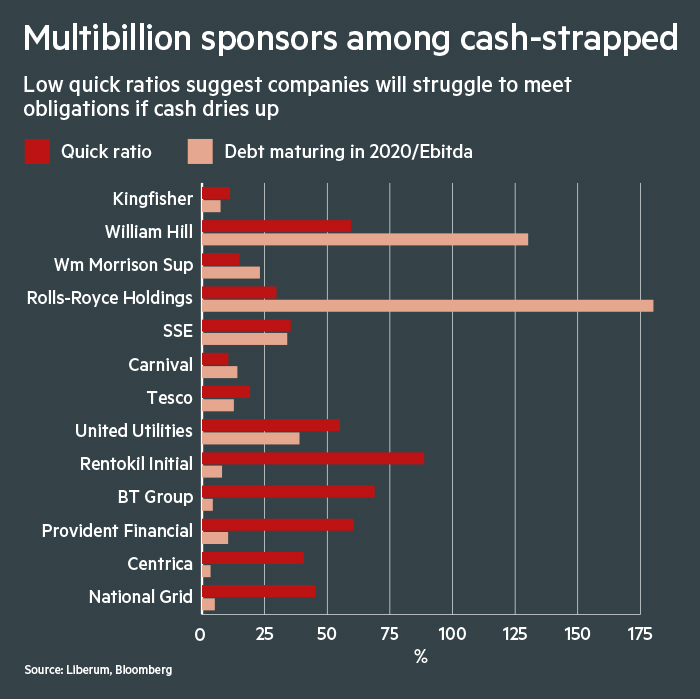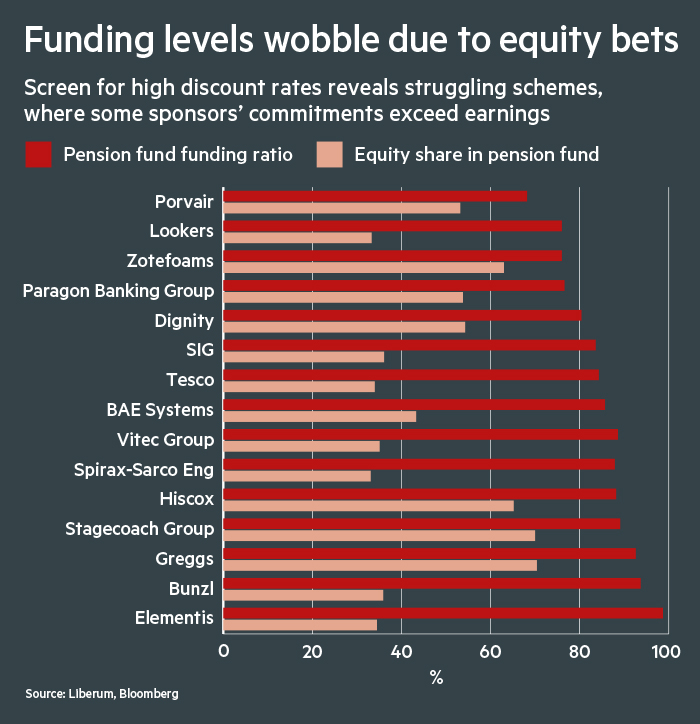Sponsors of some of the UK’s largest defined benefit pension schemes are among those exposed to a potentially unsustainable level of debt if their cash flows dry up, new analysis has suggested.
A lockdown of the nation’s households and non-essential businesses has left many companies facing drastic reductions in revenues and difficulties meeting obligations, resulting in interventions by both the government and regulators.
A screen by Liberum of companies with debt maturing in 2020 and high leverage revealed high-profile companies including BT, which sponsors a pension scheme with more than £50bn in assets.
These companies might have a problem because, even if they sell everything they have, they can’t cover their current liabilities
Joachim Klement, Liberum
Meanwhile, defence contractor BAE Systems was identified by a separate analysis as being among those companies with a potentially vulnerable pension scheme. Although its £22.8bn plans are 85.7 per cent funded on an accounting basis (a £1.9bn actuarial deficit), it has relatively high exposure to risk assets and last year’s cash injections represented a pension expense well in excess of its earnings.
The company has promised a further £1bn one-off payment to its scheme in coming months along with its scheduled £240m and £250m contributions for 2020 and 2021 respectively.
Supermarket giant Tesco was the only company identified in both analyses – although it announced a £2.5bn special contribution that was expected to clear its funding deficit in March and is one of the few businesses not expected to face a huge dent in demand resulting from the Covid-19 pandemic. The company issued a bond to cover its 2020 maturity on Monday, and touts its investment grade rating and £3bn undrawn credit facilities in its full year results.

Revenue collapse brings accessible cash into spotlight
Across the FTSE All-Share, levels of debt maturing in 2020 look to be manageable and well spread, according to Liberum. But its analysis, which screened for debt maturing this year, high debt relative to earnings and low quick ratios, revealed companies that may struggle in the coming months.
A quick ratio measures a business’s ability to access cash quickly, by comparing cash, marketable securities and accounts receivable to current liabilities. A ratio of less than 100 per cent indicates that in the event of a complete collapse in revenue, it may not have enough to meet its obligations.
“It’s kind of an emergency ratio, normally you’d never look at it,” said Joachim Klement, analyst at Liberum.
However, the drastic falls in demand seen by businesses unable to navigate the lockdown have brought this vulnerability into the spotlight. “These companies might have a problem because even if they sell everything they have, they can’t cover their current liabilities,” Mr Klement continued.
Liberum also looked at companies with high DB discount rates and allocations to equities, as these schemes may have suffered in the recent stock market crash.
BAE, for example has a 45 per cent allocation to “equities and pooled investments”. Its pension expenses last year represented 178.4 per cent of earnings, although the company has provided an update saying this year’s payments are safe.
Mr Klement said that BT and BAE Systems narrowly avoided being on both lists. “If you have companies that are on both lists, those things add up,” he said, although he added that these companies have remained operational during the crisis to some extent, especially in the case of Tesco.
In response to these funding concerns, the Pensions Regulator has staged a series of interventions in the DB market, most notably by stating that trustees can grant three-month deferrals of contributions, even where they may not have all the evidence they would usually require. 
Low takeup of DRC holiday
However, new analysis by consultancy LCP suggests that fewer employers may take advantage of this get-out than previously expected.
Compiling its 300 administration and advice clients with a poll of experts representing 200 schemes, the consultancy estimated that at least one in 10 plans are likely to see their sponsors delay payments by at least three months.
The deferrals could therefore account to around £500m, given that Office for National Statistics data show around £5.5bn is paid into DB schemes each quarter.
“When I started looking at this I thought it was going to be 100 per cent,” said Steve Webb, partner at LCP. He surmised that employers may hold off these requests because either their scheme or business is still thriving, because the payment of contributions is often not spread evenly across quarters, or due to reputational concerns.
He suggested that the regulator might take a dim view of companies that “have three months off now, and then come back and say ‘we’ve got a really strong covenant’” to justify future excess risks in investment or funding.
Trustees may also decide to block requests to defer, either because they feel that reducing contributions is unnecessary, or because they feel that there is little chance of the employer being any more able to pay its debts in three months.
“The three-month suspension of DRCs certainly isn’t a given,” said Richard Butcher, managing director at professional trustee company PTL. He said trustee should be asking for similar information on leverage and the sustainability of the business, particularly wher lending facilities are up for renegotiation.
“We wouldn’t withhold that unnecessarily, we certainly don’t intend to do any damage to the company, but there may be cases where we can see that a three-month deferral may be to the detriment of the members,” he said.

























